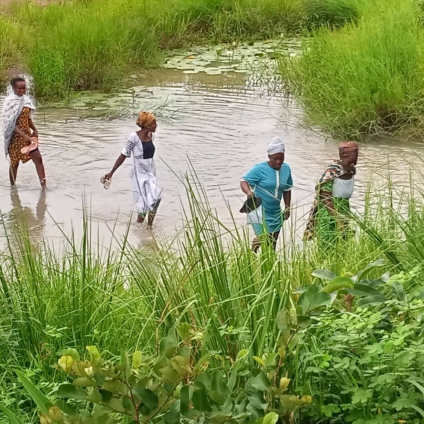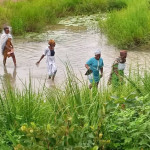The chiefs and people of Kunkuya, Dakompilayiri, and four surrounding farming communities in the Sawla-Tuna-Kalba District of the Savannah Region have appealed to the government of Ghana and the Japan Embassy in Ghana to provide them with potable water and a motorable road network that will link all six communities to market centres in Tuna and Sawla, the district capital.
The residents, in making the passionate appeal in an interview with Myjoyonline, said the support will be crucial to improving their total well-being.
In 1985, residents of Dakompayiri and Kunkuya communities mobilised resources through the sale of cattle and had a dug-out with a locally built bridge across it.
The washing away of the bridge has been an annual affair until last year, when the floods flashed out the road with the bridge, compelling commuters to risk moving through the water.
The Chief of the Dakompayiri and Kunkuya communities, Mr. Amos Seidu, told Myjoyonline that his people are suffering from a lack of basic social amenities and need their road network to be fixed.
According to him, the fixing of the road network will go a long way towards improving their lives and stopping the needless maternal mortality cases in the area.
"The situation is very bad because these two key things—the road and potable water—are non-existent in Kunkuya, Dakompilayiri, and the other four surrounding communities. So, I'm appealing to the government and also reminding the Japan Embassy in Ghana to revisit my request on Dakompilayiri's dug-out bridge, which collapsed some years ago," Eku-Ewiliwura Amos Seidu said.
Despite numerous appeals in the past, the chief expressed his optimism that they will be given a listening ear by the relevant stakeholders this time around.
Some residents complained about having to participate in elections repeatedly, and yet there's no development to show for it.
One said, "It's like Ghana doesn't add us to its development plan, but whenever it's time for elections, they will run and come as if they like us. We are waiting for them this time around. No clinic, no portable water, and no good road network, as if it's a crime to come from this part of Ghana."
"As you can see, if we, the parents, are struggling to cross the river, what happens to the kids? Last year, a child got drowned but was later rescued, so we need the support badly, Afia Naateg indicated.
"Anytime a woman is in labour, there's no clinic, and there's no road for cars to come in and convey such women. So, we carry the pregnant women on our shoulders and walk across the water to the opposite side before continuing on foot till we get to Tuna, and sometimes, the women lose their lives where there's a little delay on the way to Tuna. So, when we get a CHIPS compound or a clinic here, all these will be addressed."
Source: myjoyonline.com





